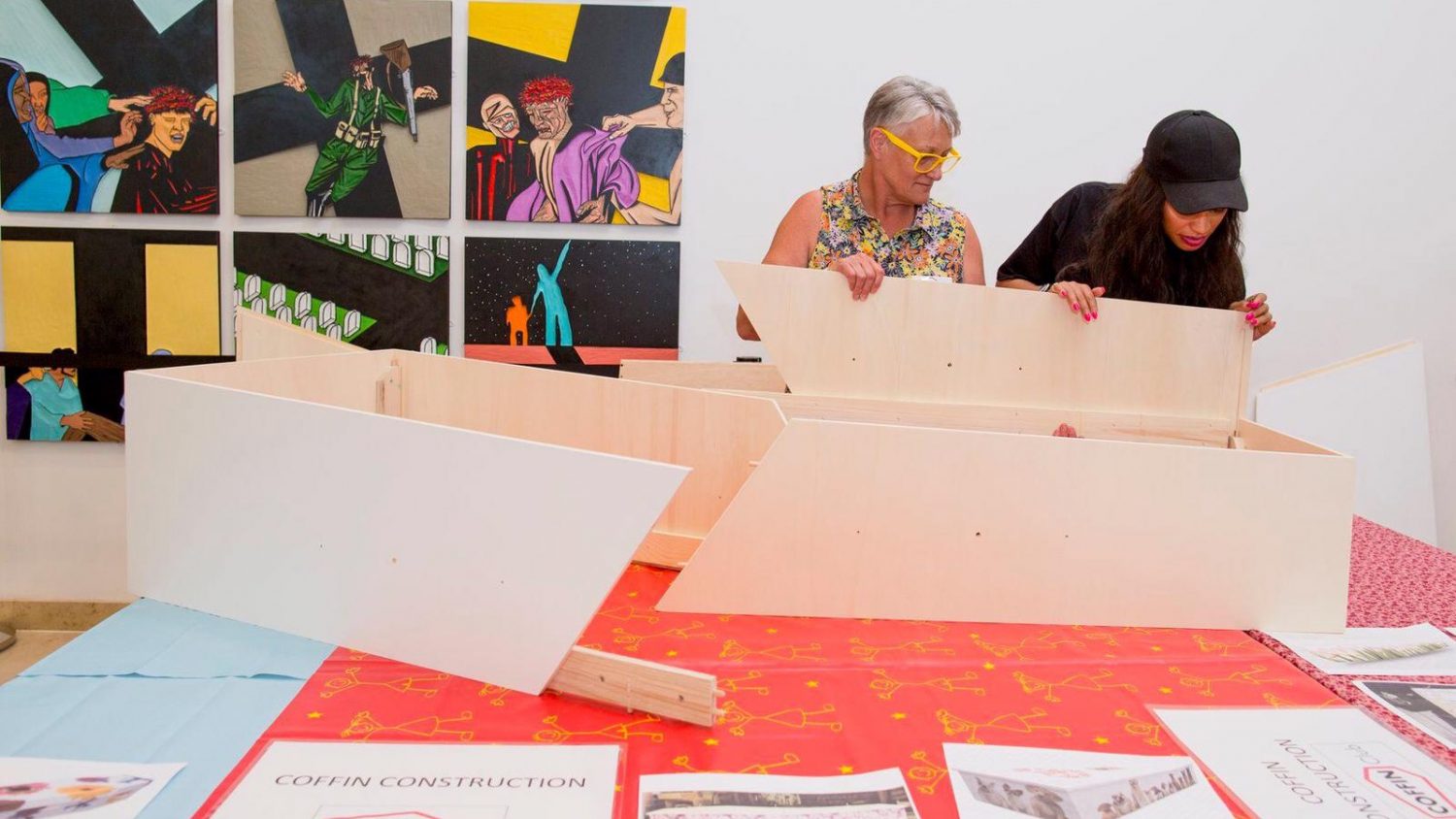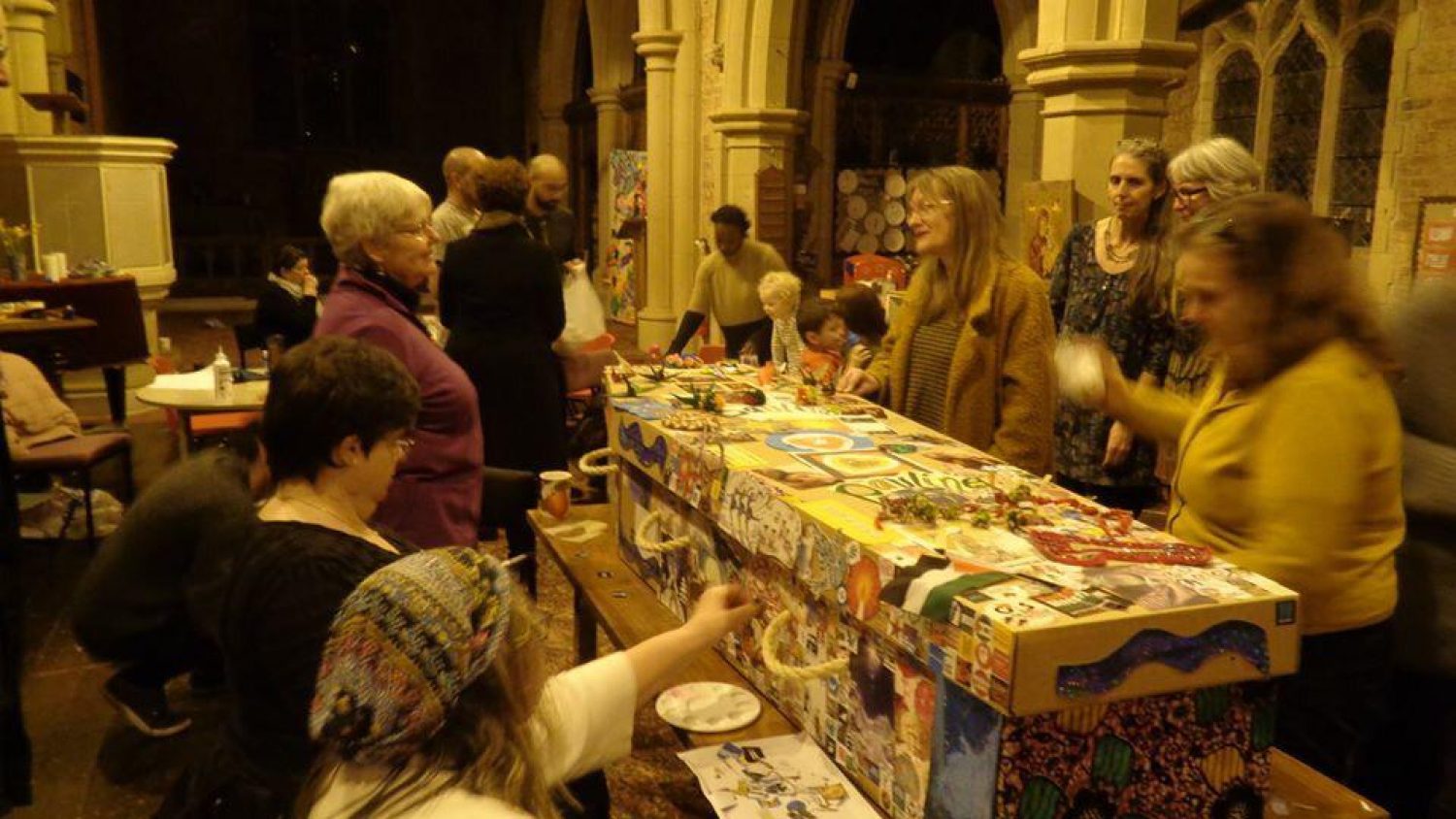Four minute read
Would you like to build your own coffin? Meet Jane Morgan and Ruth Valentine, two funeral celebrants who co-founded the north London branch of Coffin Club. They talk feminism and death care, funeral poverty and learning how to live with death.
What is Coffin Club?
Jane
Originally Coffin Club was an idea from New Zealand, where a group of older women decided they wanted to take control of their own end-of-life choices and weren’t particularly happy with what you could get on the market — so they set up a coffin building club!
Coffin Club gives people advice about how to plan a funeral. A big part is also the creative aspect of building and decorating your own coffin.
How did you two get involved?
Ruth
Well, we’ve run a death café for a few years. It was a logical extension of that. A death café is essentially emotional — it's not meant to be factual. But we knew how much people wanted facts.
Many people are terribly worried about things like whether they'll be able to afford the funeral or whether their family will get into debt. So Coffin Club was a space to have those discussions.
Is it still mostly women taking part?
Jane
Yes, I think some of it is about reclaiming what women always did. Traditionally, women in the community would be the ones to look after the dead.
Women were more able to talk about their emotions and assist others to do the same. That's beginning to change, but I think it's still predominantly true.
Do you think this kind of emotional openness has been absent from the funeral sector?
Ruth
Absolutely, yes. I trained as a celebrant in 2009 and when I went around funeral directors there wasn't anywhere like Poppy's yet.
The funeral directors basically said, ‘well, we know what's good for people, and we don't want them to worry their pretty little heads, so we just take control'.
What do you think is driving changes to how we think about funerals now?
Jane
Once people start to have some idea that choice is possible it really opens things up. There's so much about funerals in the media at the moment and people are beginning to question things: ‘Why are funerals so expensive? Who are these strange people in suits and top hats?’
Ruth
I also think that people are no longer deferential. In my generation, where people are now dying or looking after elderly parents, we don't expect to be told what to do.
Very few people want to find somebody in charge and hand things over to them. Just because something has been good enough for ten generations, doesn't mean it's good enough for you.
How have people reacted to Coffin Club so far?
Jane
When we set up the first programme, I thought 'what if nobody comes?' But twenty people came and they were all bowled over.
A really good example was a woman called Willow. She was dying and had seen Coffin Club advertised in a local Facebook group. She was so determined to be there that she came directly from a radiotherapy session.
She was there every week and was a very vocal part of the group. We empowered her so much that we were redundant when it came to her death and funeral.
Myself and the funeral director she chose went with a couple of her family members to her bedside in hospital. She made it clear exactly what she wanted and got a credit card to pay for it at the bedside.
We didn't even get invited to the funeral, the family did it all themselves — and it was amazing. I think we should make her our posthumous patron.
What kind of topics come up at Coffin Club?
Ruth
We talk about good funerals and bad funerals, planning a funeral, and people who have done innovative things in the past. There’s also a lot about how to save money.
Why do you think funeral poverty has become such a huge problem?
Ruth
Because the big companies rip people off, frankly. Also, because a lot of people are poor.
So inequality, austerity and rip-offs — that's my diagnosis.
Jane
It’s also coupled with the traditional, ‘we just don't ask any questions’. People still think that it's a little bit distasteful to shop around and ask about money when you're talking about death.
All these phrases about giving someone the best send-off and doing the best we can — I think that can really muddy the waters. We're all about trying to encourage people that it's good to shop around because that's how you get what you need.
Do you think that coming to Coffin Club helps make death less frightening?
Ruth
I'm not sure how much the people who come to Coffin Club are frightened in the first place. If you're going to come and sign up to six Tuesday mornings you're not going to be too scared.
I do think [building the coffin] makes death real. It's fine having discussions but doing something physically makes you engage with it in a real way.
Jane
Sometimes I think about myself being involved in Coffin Club and death cafes. Does that mean I’m not scared of death and dying? I don't always think that's the point — let's discuss how scared and upset we are.
In the end, it’s about showing people that they're in charge and asking them, ‘what would you like to do?’.
Find out more about Coffin Clubs in the UK or follow Coffin Club North London on Facebook.
Inspired by Ruth and Jane? Read more about incredible women in the history of death care — or find out how to record your own funeral wishes with Poppy's.
To stay in touch with all the latest news and updates from Poppy's by email, sign up here or contact us if you need help planning a funeral.

